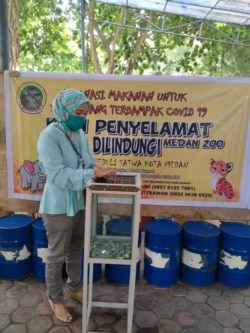The Medan Zoo relies on admission fees to make ends meet.
Or it did, anyway.
On March 1, the Indonesian government announced the nation’s first two cases of COVID-19, and by mid-March the crowds had stopped visiting the 30-hectare zoo. On March 23, the attraction in North Sumatra closed along with other businesses to help slow the spread of the coronavirus pandemic.
The zoo’s 270 animals, including star-attraction tigers, must be fed, though, and so last month the zoo launched a fundraiser. It began collecting coins to offset a financial crisis, one rupiah at a time.
"All animals in the Medan Zoo are in danger of dying from hunger,” said the zoo's head of the publication division, Aini Chaniago, according to the Jakarta Post. “We don't have enough money to buy them food."
The cost of food is not insignificant. One adult tiger alone can consume almost 4.5 kilograms of raw meat per day, plus bones, according to animal managers at the Columbus Zoo and Aquarium in Ohio.
Other zoos in Indonesia also are facing financial pressures like those at the Medan Zoo. The Indonesia Zoo Association, which is conducting its own fund drive, found that only a handful of zoos had enough food on hand to feed their animals after mid-May, according to the Jakarta Post.
Worldwide, many zoos are experiencing the same cash crunch due to the COVID-19 pandemic, as fewer people, if any, visit.
In Europe and the US
The director of Germany’s Tierpark Neumünster Zoo made headlines when she told the German news agency DPA that money was so tight some animals might be slaughtered to feed others. A zoo spokesperson told The New York Times that Vitus, the almost 12-foot-tall polar bear, would be spared until the very last.
Dan Ashe, CEO of the Association of Zoos and Aquariums (AZA), told Buzzfeed that accredited AZA members in the United States would probably move animals to other zoos that could care for them. Many AZA zoos have gone online with educational programs, a boon for families sheltering in place.
That the Monterey Bay Aquarium otter, jellyfish and other marine life cams stream directly above a “Donate Now” button may not be coincidence. Across the country, at the Smithsonian National Zoo in Washington, the animal cam stars request donations to “our emergency fund.”
Tigers help cause
In Medan, the zoo’s coin collection is raising money. Announced online, the zoo makes it easy for people to contribute. Donors can drop off change at the zoo or transfer funds to the Medan Zoo bank account.
Given the pandemic-driven global popularity of the Netflix docu-series Tiger King: Murder, Mayhem and Madness, it isn't surprising that a coin collection by a zoo with so many hungry tigers grew steadily.
“Thank God this initiative has been welcomed by the community of the City of Medan,” said Putrama al-Khairi, director of the District Business Development of Medan, which operates the zoo that is owned by the regional government.
Putrama said donations, dedicated to food purchasing, have arrived from Jakarta, Indonesia’s capital more than 1,000 kilometers away, and even Singapore.
“The participation for the coin drive is expanding,” Putrama told VOA Indonesia on Wednesday via online messaging.
“Today the agriculture and animal husbandry unit of the Medan municipal government told us to send a detailed list of the daily animal food needed by the zoo,” he said, adding compliance with the request came very quickly.
New business model needed
According to Putrama, local regulations preclude Medan’s municipal government from assisting the Medan Zoo, which is a business. To save the animals and secure the zoo’s future, he believes the attraction should be supervised directed by city government, a model used for other Indonesian zoos.
“We have written to the government of Medan and we hope the Medan Zoo problem could be resolved,” he said. The financial problems facing the zoo are greater than feeding the animals, he added, because the zoo’s employees, from two veterinarians to the cleaning crew, must be paid. “That’s why we formally wrote this letter,” he said. “We hope that [municipal management is] the best solution for the Medan Zoo.”
Rosek Nursahid, the chair of ProFauna Indonesia, said the government should intervene so that a financial crisis like the one facing the Medan Zoo can be avoided in the future.
“Animals in a zoo are entrusted entities and the government needs to pay attention to this matter,” he told VOA Indonesia. He urged zoos to learn from the Medan Zoo’s experience so that “in the future, zoo institutions should consider alternative funding sources for their operations.”
Indonesia’s Ministry of Environment and Forestry is reviewing how zoos operate, including how zoo permits are obtained, according to Nursahid.
“One important consideration is the funding preparedness in an emergency,” he said. “There has to be an alternative funding source. If not, in another disaster situation … this problem will be repeated.”










